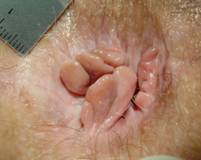 Have you been using too much toilet paper because of pesky anal tags? Hemorrhoidal skin tags (piles) are flaps of skin or flesh found around the anus. They often form as a result of an existing hemorrhoids.
Have you been using too much toilet paper because of pesky anal tags? Hemorrhoidal skin tags (piles) are flaps of skin or flesh found around the anus. They often form as a result of an existing hemorrhoids.
Anal tags are the shapeless lumps and flaps of skin and tissue found at the anal verge. They’re quite common and usually come with other anorectal problems, such as hemorrhoids.
Anal skin tags often occur if an individual heals the thrombosed external hemorrhoids at home without surgery, the thrombosed hemorrhoids may leave behind skin tags. Anal sentinel tags may also form because of non-hemorrhoid causes, such as anal fissure, surgery, or infection, etc.
Despite the fact that people often confuse them with cancerous growths, skin tags are benign and present no serious health concerns.
Hemorrhoidal skin tags often don’t cause significant rectal symptoms, but they often affect the cleansing after bowel movement. If feces become trapped beneath the skin tags, it can cause irritation and lead to itching and further inflammation. Skin tags can also cause pain when it flairs up or if there’s another underlying rectal problem.
Patients suffering discomfort or itching due to hemorrhoidal skin tags can treat the condition with the following:
- Thorough cleaning of the affected area after bowel movement. May use gentle cleansers, such as witch hazel or aloe vera extract.
- Do a Sitz bath with warm water.
- May use OTC hemorrhoid cream to reduce irritation and swelling.
- If the skin tags frequently cause symptoms, individuals may consider having them removed surgically.
- Most patients who have anal tags often have hemorrhoids, too, they should consider complete care by treating internal hemorrhoids before removal of anal tags or at the same time.
Excision of anal tags (piles):
Anal tags can easily be removed in the office using local anesthetic. A radiofrequency device is used to get rid of skin tabs and resurface the anal area to acquire a good cosmetic result. The procedure takes less than 10 minutes and patients are safe to drive immediately afterwards. There may be mild postoperative pain and discomfort with bowel movement in the first week. The patients are typically able to go back to work next day although the whole healing process may take a few weeks. If the patient needs a hemorrhoidectomy, anal tags can be removed together as part of hemorrhoidectomy. If the anal tag is extensive, two stages of surgery may be necessary to avoid anal stenosis.
 Severe pain is not a common symptom of hemorrhoids, because internal hemorrhoid happens in the area above the dentate line that is supplied by the visceral nerve, like those found within the intestines, which sense pressure rather than pain. Mild aching pain and skin iritating pain in the rectum is common because of local inflammation.
Severe pain is not a common symptom of hemorrhoids, because internal hemorrhoid happens in the area above the dentate line that is supplied by the visceral nerve, like those found within the intestines, which sense pressure rather than pain. Mild aching pain and skin iritating pain in the rectum is common because of local inflammation.  The average American spends over five hours per day scrolling through Instagram feeds, checking Twitter, answering emails and texts, and watching Netflix—all via smartphone devices and, more often than not, while sitting. Add in the extra layer of using these mobile devices during bathroom trips, and most of us have significantly increased our risk of developing hemorrhoids.
The average American spends over five hours per day scrolling through Instagram feeds, checking Twitter, answering emails and texts, and watching Netflix—all via smartphone devices and, more often than not, while sitting. Add in the extra layer of using these mobile devices during bathroom trips, and most of us have significantly increased our risk of developing hemorrhoids. Hemorrhoids, abscesses, fistulas, fissures, anal itching, rectal prolapse—with so many anorectal disorders out there, it’s hard to keep track of which is which. Two of these conditions, anal abscesses and anal fistulas, are closely linked to one another but can be easily distinguished via the guidelines below.
Hemorrhoids, abscesses, fistulas, fissures, anal itching, rectal prolapse—with so many anorectal disorders out there, it’s hard to keep track of which is which. Two of these conditions, anal abscesses and anal fistulas, are closely linked to one another but can be easily distinguished via the guidelines below. Bleeding from your rectum or anus is never a pleasant experience, and it can understandably cause immediate panic. Generally, bright red blood indicates bleeding in the lower rectum, while dark red blood indicates bleeding from deeper and further up in the body. While passing dark red blood is usually a sign of digestive bleeding and requires immediate attention,
Bleeding from your rectum or anus is never a pleasant experience, and it can understandably cause immediate panic. Generally, bright red blood indicates bleeding in the lower rectum, while dark red blood indicates bleeding from deeper and further up in the body. While passing dark red blood is usually a sign of digestive bleeding and requires immediate attention,  Because the symptoms of hemorrhoids and early-stage rectal/colon cancer are very similar, people often confuse and, at times, misdiagnose the two conditions. Since the treatment method for each condition is vastly different, it’s important to know how to differentiate hemorrhoids from rectal cancer and proceed with the appropriate treatment options.
Because the symptoms of hemorrhoids and early-stage rectal/colon cancer are very similar, people often confuse and, at times, misdiagnose the two conditions. Since the treatment method for each condition is vastly different, it’s important to know how to differentiate hemorrhoids from rectal cancer and proceed with the appropriate treatment options.


